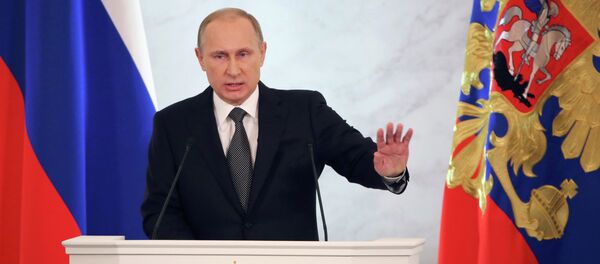MOSCOW, January 13 (Sputnik), Daria Chernyshova — The downgrade of Russia's credit rating by the Big Three rating agencies will hamper growth in the country while alienating foreign direct investment (FDI), the founder of Egan-Jones Ratings Company told Sputnik news agency.
"A downgrade of Russia is likely to increase the cost of funding, hamper growth, and place additional pressure on asset values," Sean Egan said, adding that FDI into Russia will also be influenced by the recent downgrade of Russia"s credit rating.
"The investors who rely on the Big-3 for their risk assessment will not be investing in Russia because they will be negative to Russia as a result of intense negative press coverage. International investors always look at the international press for background," former president of the RusRating agency and current CEO of the recently founded Universal Credit Rating Group (UCRG) Richard Hainsworth told Sputnik.
UCRG was created with the participation of Russia"s RusRating, China"s Dagong Global Credit and US Egan-Jones Ratings. Its first ratings are expected later this year and the goal is to create an alternative to the Big Three ratings — namely S&P, Moody"s and Fitch.
UCRG is expected to satisfy the demand of those investors who have repeatedly criticized the Big Three agencies for taking standardized approaches that overestimate the opportunities of developed economies while underestimating those of developing ones.
"The Big-3 also seem to reflect the international press image rather than internal Russian realities," Richard Hainsworth explained adding that one of Russia"s problems is that its leadership "has never recognized the importance of external image and the impact it has on direct investment."
"Over the medium term investors will move away from treating the BRICS similarly," Jones said. "India and China will benefit from the petroleum price collapse. Mexico, Venezuela, Brazil and Nigeria are hurt. Canada also is hurt but to a lesser degree because the economy is more diversified."
Mitch Feierstein, a hedge-fund manager and chief executive of the Glacier Environmental Fund Limited, underlined that credit ratings agencies are heavily influenced by a myriad of conflicts and external factors, including politics and economics.
"The Big-3 do not have a pristine track record of getting it either timely or right; in fact, they all entirely missed the USA subprime crisis that brought down Lehman Brothers and Bear Stearns," Feierstein told Sputnik, reminding that "the same credit agency that downgraded Russia"s debt also rated subprime bonds "AAA" in 2005/6."
He also underlined that Russia learned a valuable lesson in 1998, when it defaulted on its debt and moving forward it "demonstrated fiscal responsibility." Moreover, current problems in the Russian economy have been worsened as Moscow "has been vilified by western media and cut off from big European banks traditional capital markets funding, compounded by a predictable 55% decline in oil as well as a sharp decline in commodities prices."
He concluded by saying that there is a significant chance that the western ratings agencies are "encouraged" to assign negative ratings, as they are motivated by political considerations as well as "sanctions", "lack of traditional access to capital markets funding and falling commodities prices."
In turn, Richard Hainsworth urged that Russia"s investment diplomacy needs to improve, as "only a change in external image, either due to changes inside Russia or a different approach to its own international PR, will bring down the negative influence of the press and the credit ratings of the Big-3."
Standard & Poor"s (S&P) has given Russia a BBB- credit rating. A downgrade, which the rating agency said was 50 percent possible, could possibly cause Russia to lose its sovereign debt status. Russia"s national currency has plummeted alongside oil prices in recent months, losing some 40 percent of its value against the dollar since summer 2014.




